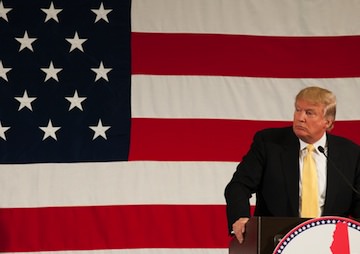Can a Moderate Left Beat a Radical Right?
Obama Derangement Syndrome is striking Republicans once again. But for progressives to beat back an increasingly virulent right and encourage more temperate conservatism, they must ponder the crisis on their own side. Andrew Cline / Shutterstock.com
Andrew Cline / Shutterstock.com
Obama Derangement Syndrome is striking Republicans once again.
To avoid having to answer for the rise of Donald Trump, they want to hold the man in the White House responsible for the emergence of a demagogic showman who has been the loudest voice challenging the legal right of the winner of two elections to be there.
Obama picked his words carefully but with some quiet glee when he was asked about this at a joint news conference with Canadian Prime Minister Justin Trudeau on Thursday. “I have been blamed by Republicans for a lot of things,” Obama said, “but being blamed for their primaries and who they’re selecting for their party is” — here he paused, enjoying the moment — “novel.”
On the contrary, Obama insisted, it was Republicans who had created “an environment where somebody like a Donald Trump can thrive” and allowed “the circus we’ve been seeing to transpire.” He urged his opponents to “do some introspection.”
That would be nice, wouldn’t it?
I should acknowledge a stake in this fight, having published a book in January called “Why the Right Went Wrong” arguing that the emergence of Trump was the logical consequence of a half-century of conservative history and of the steady legitimation of extremist ideas within the GOP. The nation, not just the Republican Party, desperately needs a different and more constructive brand of conservatism.
But if progressives are to beat back an increasingly virulent right and encourage the emergence of a more temperate form of conservatism, they have to ponder the crisis on their own side that is visible in this campaign and in most of the European democracies as well.
The strength of Bernie Sanders’ challenge to Hillary Clinton from the left, like the radicalization of American conservatism, is a symptom of the decay of a moderate brand of progressivism that rose in the 1990s when Bill Clinton was president and Tony Blair was Britain’s prime minister. Its ideology was rooted in a belief that capitalism would deliver the economic goods and could be balanced by a “competent public sector, providing services of quality to the citizen and social protection for those who are vulnerable.”
Those last words are Blair’s from a collection of essays by 11 center-left politicians from around the world released on Friday by the Center for American Progress and Canada 2020 to coincide with Trudeau’s visit to the United States. The title of their effort, “Global Progress,” is optimistic and Bill Clinton, for one, continued to express confidence that government could “empower people with the tools to make the most of their own lives and to create the institutions and conditions for them to succeed.”
This never stopped being a good idea, but the sober reflections of Ricardo Lagos, Chile’s former president, pointed to the “significant challenge to progressive politics” created by the economic crisis of 2008. It raised “profound questions” about policies “that favored the deregulation of the economy and allowed the financial system to self-regulate.” The moderate left, it turns out, had more confidence in a loosely governed capitalism than was merited by the facts.
And in the post-crash period, progressives largely lost the argument against austerity policies. A significant exception was the United States during the first two years of Obama’s term: Keynesian policies helped lead to a revival of the American economy that was faster and more robust than in other places. But continued economic sluggishness, Lagos argued, feeds “the anger and alienation of a dangerous populism on the extreme left and right.” Trudeau himself said Friday that the economically excluded “don’t feel like this idea of progress still holds.”
Lodewijk Asscher, the deputy prime minister of the Netherlands, wrote of the challenge to national identity created by immigration and the fear of terrorism. He called for “building a society based on solidarity in which people are seen as individuals instead of members of their group and someone’s background remains just a background.” Well, yes, but, as Asscher no doubt knows, this is easier said than done.
If Republicans delude themselves that Obama is responsible for Trump, there’s little hope for the soul-searching their party requires. But progressives of moderate inclinations can’t use the right’s shortcomings to blind them to their own call for reflection. Those who believe in gradual, steady progress need to provide plausible responses to a world both less secure and less orderly than it was in the 1990s. Otherwise, the alternatives, as Trump is showing us, will be both irrational and grim.
E.J. Dionne’s email address is [email protected]. Twitter: @EJDionne.
© 2016, Washington Post Writers Group
Your support matters…Independent journalism is under threat and overshadowed by heavily funded mainstream media.
You can help level the playing field. Become a member.
Your tax-deductible contribution keeps us digging beneath the headlines to give you thought-provoking, investigative reporting and analysis that unearths what's really happening- without compromise.
Give today to support our courageous, independent journalists.






You need to be a supporter to comment.
There are currently no responses to this article.
Be the first to respond.